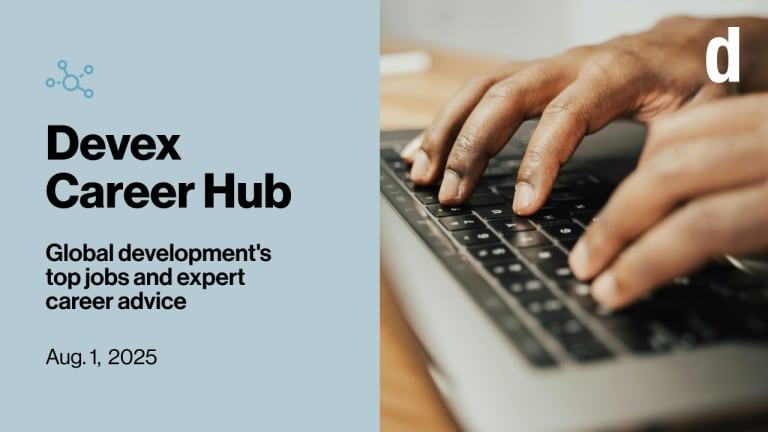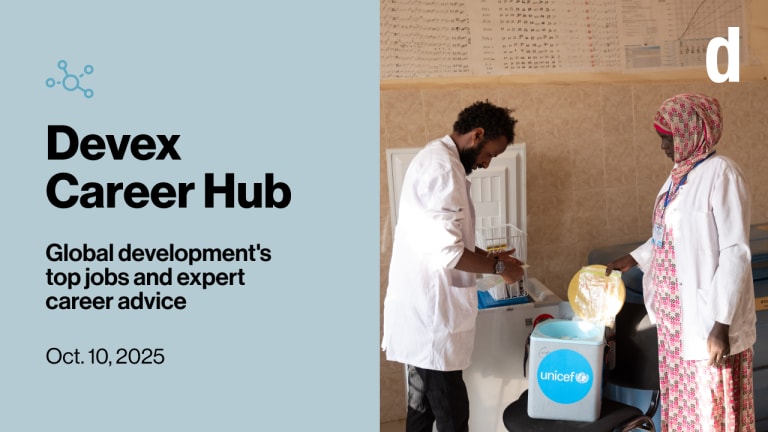Globaldev careers: The country representative
Listening, communication, and decisiveness: Kate Heuisler, country representative for DAI in Cambodia, discusses the key skills needed in this role.
After serving for five years as DAI’s chief of party on a Development Innovations project funded by the U.S. Agency for International Development in Cambodia, Kate Heuisler is now the organization’s country representative there. It can be a really rewarding job, Heuisler said, especially for those who find an organization that aligns with their programmatic priorities, personal values, and work style. There are also lots of opportunities in the sector for professionals interested in these types of leadership roles. From larger development organizations to social enterprises and startups, many employers are looking for adaptive leadership skills, Heuisler said. Devex finds out about the day-to-day challenges for a country representative, such as keeping staff members motivated and achieving results. This conversation has been edited for length and clarity. What is the role of a country representative? [The roles of] DAI’s country representatives are really different in different geographies. … But for me in Cambodia, I oversee DAI’s country programs. ... I generally represent the company with government and civil society. ... I also provide technical assistance to different projects in Cambodia and the region, and I generally manage relationships with all of the stakeholders. What does your average day look like? Every day is really so different, and I think that that's true in any executive leadership position because you don't have a clear list of tasks to start with. When planning my day and my week, my focus is on people, on projects, and then networks. I check in regularly with DAI teams in Cambodia — sometimes multiple times a week, sometimes multiple times a month. [It] really depends on what they need from me, whether it's in terms of relationships with local stakeholders, government, or civil society, or sometimes it's more of a programmatic need or some kind of troubleshooting. I am really here, in many cases, on a demand-driven basis. … Then on a semimonthly basis, we bring together everybody that works under the DAI flag in Cambodia. I also meet with a lot of stakeholders for our projects — that could be the clients that are hiring us for the work or our partners in civil society, government, [or the] private sector — and that's often to find out what is going on in the sectors where we're working and where we need to engage and seeing if anybody is learning something new that I can help bring back into DAI's programs. Then, since I'm also a technical adviser on some of DAI’s programs here and in other countries, my schedule really varies. Sometimes I'll be on a multihour or multiday incubator to design a new project. These days, [it’s] mostly on video calls. But in better times, it can be in a room with many whiteboards. The other thing that I might do within a day is be looking at some of our research products and providing feedback or even testing out some of the new technology solutions that we are developing with partners. “Rather than seeing [your career as a] linear path, look at it as a bento box where you are bringing together all of these different skill sets that help you build a more balanced career for yourself.” --— Kate Heuisler, Cambodia country representative, DAI What are some of the biggest challenges of the role, and what lessons have you learned to help you overcome those? I think one of the key challenges is if you do not like ambiguity. If you want somebody to give you a list of things to do each day and you want this very fixed schedule for your week, this is going to be a hard role for you to take. I think that the really key skills are [being able to] think with a growth mindset, to just embrace the day and aggregate large amounts of information ... and then synthesize [that] for action — so to really figure out what we have to do as a result of all of these inputs from many different countries, many different perspectives. And then [think about] how do you work with the right actors in your organization and your stakeholder network to get decisions made and get things done. I think to be successful in this role, you really have to be comfortable with ambiguity and be able to pull all of those pieces together and try to drive decision-making. I think it's [also] really important … to think about how you are communicating to your teams frequently. Make sure that you check in frequently, that you ask them separately and not [just] in the group setting what they heard if you're defining a new strategy or new direction [for example], and really over-communicate where the project is going or where the company is going, because I think it saves so much time. It can really help keep people motivated when they feel that they are all on the same page and working towards this one goal. What are the best — and worst — parts of the job? I think some of the best parts are when you get to be in a country over a longer period of time. I [have been here for] six years now, and I think you really are able to track a lot of changes and see how some of the partners you're working with are growing or shifting. [Also] you get to see some of the consultants or long-term staff members that you're working with move from maybe starting out as an intern to now being a product developer or some other senior trainer. This is really one of the best parts of the job and one of the reasons that I wanted to stay. These days, [the worst part is] just not being able to travel to all the countries where I work — which is my favorite part of any job — and the way that COVID has restricted travel is a challenge for me and my personality and how I engage, how I figure out what the needs are anywhere I'm working, [how I] build relationships and listen. How do you see the impact of your job on a more day-to-day basis? One of the ways that I see the impact is when I create a physical space for team members where people are happy and laughing and working hard — not because somebody is telling them they have to finish this deliverable, but because they really want to work hard for the larger strategy that we're all pursuing together — or, because we work a lot with Cambodian-based partners ... to see that growth and to see the way that people want to come to work and want to solve some of these intractable problems. That's where I see the value. What advice would you have for anyone interested in pursuing this type of role? I think you really have to be a great listener, you have to be a great communicator, and you have to be decisive. So often, that is what people really want: educated, thoughtful, and quick decisions when they're needed. However you can build that skill set within any job, that'll really help you as you move towards any senior leadership position. Also remember that you're only as good as the makeup of your team. … You are only there [in a leadership role] because of the team that helps you get there, and you're only going to be successful if you can keep them motivated, keep them invested in a strategy, [and] listen and adapt to what they need. These days, while we are all running so many webinars and online events, there are a lot of ways for you to tap into leaders … at many of these organizations and just listen to what they're talking about, listen to what they are reading, what kind of questions they are asking as they do research in a new area. I think that you have a lot of digital windows [to access] those people ... right now, so I would say just try to take advantage of that. What should people know before pursuing this type of role? In my experience so far, I think that careers in development are very rarely on a totally linear path. Try to figure out how you make sure that every single job you have is a building block, but also [recognize] that not every [role] is going to fit directly on top of the last block and not every job will see an increase in budget, fiscal responsibility, or some other more traditional metric. I've heard it described as a bento box — so rather than seeing [your career as a] linear path, look at it as a bento box where you are bringing together all of these different skill sets that help you build a more balanced career for yourself, especially as you get to senior leadership positions.
After serving for five years as DAI’s chief of party on a Development Innovations project funded by the U.S. Agency for International Development in Cambodia, Kate Heuisler is now the organization’s country representative there.
It can be a really rewarding job, Heuisler said, especially for those who find an organization that aligns with their programmatic priorities, personal values, and work style.
There are also lots of opportunities in the sector for professionals interested in these types of leadership roles. From larger development organizations to social enterprises and startups, many employers are looking for adaptive leadership skills, Heuisler said.
This article is exclusively for Career Account members.
Unlock this article now with a 15-day free trial of a Devex Career Account. With a Career Account subscription you will get:
- Full access to our jobs board, including over 1,000 exclusive jobs
- Your Devex profile highlighted in recruiter search results
- Connections to recruiters and industry experts through online and live Devex events
Start my 15-day free trialAlready a user?
Printing articles to share with others is a breach of our terms and conditions and copyright policy. Please use the sharing options on the left side of the article. Devex Pro members may share up to 10 articles per month using the Pro share tool ( ).
For four years, Emma Smith covered careers and recruitment, among other topics, for Devex. She now freelances for Devex and has a special interest in mental health, immigration, and sexual and reproductive health. She holds a degree in journalism from Glasgow Caledonian University and a master’s in media and international conflict.








